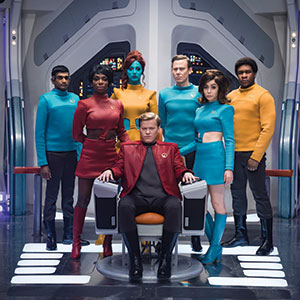

The Mirror of Black Mirror often reflects old episodes of The Twilight Zone. The fourth season opener of the hit Netflix sci-fi anthology series, “USS Callister,” stars Jesse PlemonsTodd in Breaking Bad, he’s a Golem version of Matt Damon. It is a reflection of the famous 1961 Zone episode “It’s A Good Life,” in which a group of people are trapped at the hands of an angry, childish god.
Plemons is a solipsistic game designer who worships old-school TV space adventure; he entraps a woman who turns out to be smart enough to find a way out of his game. Frightening, yes, but it’s often as hilarious a take on old-school Star Trek as Galaxy Quest.
Nothing funny at all about the Jodie Foster-directed “Arkangel,” evocatively shot in Harrisburg, Pennsylvania, on the verge of yet another long winter. The remarkably fierce actress Rosemarie DeWitt is a single mother overcome with fears for her child’s safety. Thus, she hooks up a nanny camera … from inside her daughter’s skull. In director David Slade’s “Metalhead,” rogue robots clean up the last bits of humanity on earth. Done in a crystalline black-and-white and with a bare minimum of dialogue, it’s a knockout tale of terror.
If Black Mirror creator Charlie Brooker begins with Twilight Zone, he finishes with an emulation of Zone creator Rod Serling’s 1970s program Night Gallery. In “Black Museum,” a lone woman visits a deserted roadside attraction where three particularly distressing exhibits are explained to her by the chatty maniac who runs the place, Dr. Rolo Haynes (Douglas Hodge). Haynes is a character that one hopes the show will revive in some future episodeHodge, a noted British theatrical actor, is fragrantly diabolical, with the finicky feline quality of Rod Steiger at his perviest, and the grisly operating-room humor of William S. Burroughs’ Dr. Benway.
Sci-fi writer Philip K. Dick anticipated so many of these pregnant ideas, and yet a man can only be so far ahead of his timeas the extensive rewriting of his stories would suggest in Philip K. Dick’s Electric Dreams, now streaming on Amazon Prime. This anthology plays catch-up, as Black Mirror runs off with ideas that the speculative fiction author Dick hatched decades ago. If the stars include Bryan Cranston, Juno Temple and Anna Paquin, the plots in Electric Dreams are like floor sweepings. Dick’s 1955 “Autofac,” about machines building machines isin Electric Dreams‘ tellingmade into a saga of post-nuclear hippies battling with a fully automated, world-devouring factory. One gets the impression, from Jessica Bruder’s book Nomadland, that Amazon lacks a sense of humor about itself. Surprising that they’ve helped distribute a satire of their own wish-fulfillment centers, with drones delivering machine-made goods: shot down, the drones rain products like a busted pióata. Compare it to the vision of a factory’s wrath against its consumers in “Metalhead”unleash the robot hellhounds!and Black Mirror‘s version is far more indelible.
However, the Steve Buscemi-starring “Crazy Diamond” is Electric Dreams at its best. It’s based on Dick’s short story “Sales Pitch.” Director Marc Munsen, who worked with Terence Davies and Derek Jarman, weaves in a blend of human-animal crossbreeds, Monsanto’s seed policies, coastal erosion, Syd Barrett’s The Madcap Laughs, and the baroque song “Flow My Tears” (as the policeman said, according to Dick). Sidse Babett Knudsen is most sultry as a mature android seducer in a red dress zeroing in on a chump (Buscemi) who she’s trying to manipulate into saving her life. Episodes like these show that the series could improve. (Meanwhile, where are anthology shows based on J.G. Ballard and Cordwainer Smith?)
In so many of Black Mirror’s day-after-tomorrow tales, all it takes is a glowing adhesive button placed on a subject’s temple to copy and download personalities. These avatars can be sent to eternal bliss, or they can be made to languish forever in an electronic hell. Black Mirror shows us the next step forward from Second Life, from Tinder and Twitter and the fury of social-media trolls, as it wreaks its nightmares of surveillance and imprisonment. It’s clear we have the willpower to make these tales of cruelty real. All that’s lacking now is the technology. And that will be here presently.
Black Mirror
Netflix
Philip K. Dick’s Electric Dreams
Amazon Prime



